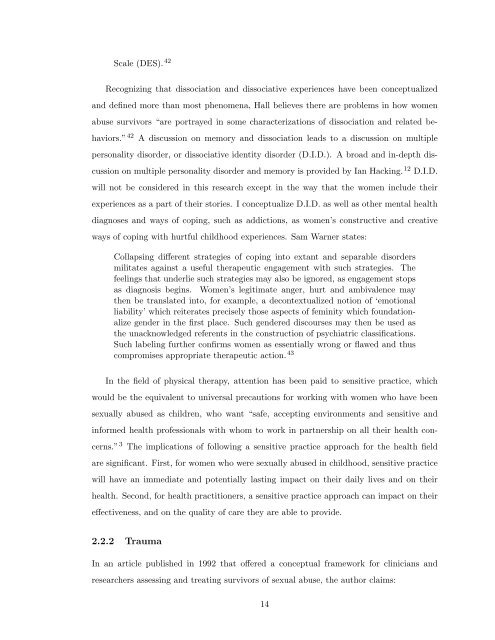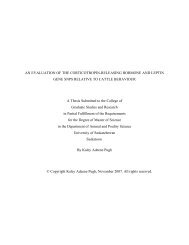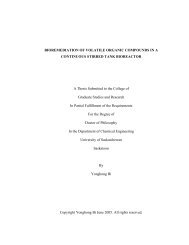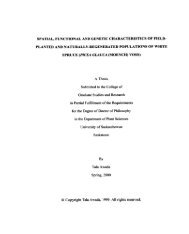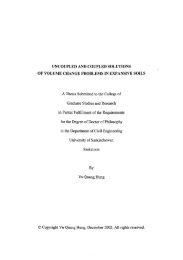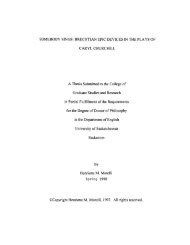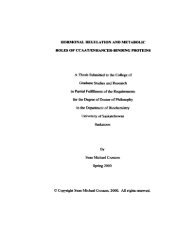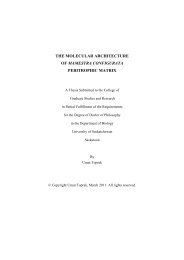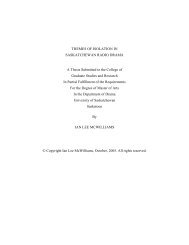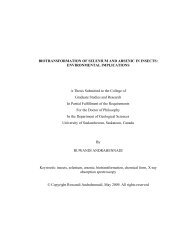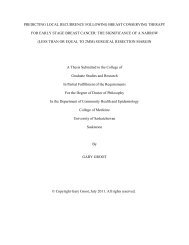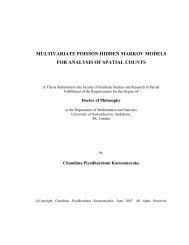Women's Narratives of Healing from the Effects of Child Sexual Abuse
Women's Narratives of Healing from the Effects of Child Sexual Abuse
Women's Narratives of Healing from the Effects of Child Sexual Abuse
Create successful ePaper yourself
Turn your PDF publications into a flip-book with our unique Google optimized e-Paper software.
Scale (DES). 42<br />
Recognizing that dissociation and dissociative experiences have been conceptualized<br />
and defined more than most phenomena, Hall believes <strong>the</strong>re are problems in how women<br />
abuse survivors “are portrayed in some characterizations <strong>of</strong> dissociation and related behaviors.”<br />
42 A discussion on memory and dissociation leads to a discussion on multiple<br />
personality disorder, or dissociative identity disorder (D.I.D.). A broad and in-depth discussion<br />
on multiple personality disorder and memory is provided by Ian Hacking. 12 D.I.D.<br />
will not be considered in this research except in <strong>the</strong> way that <strong>the</strong> women include <strong>the</strong>ir<br />
experiences as a part <strong>of</strong> <strong>the</strong>ir stories. I conceptualize D.I.D. as well as o<strong>the</strong>r mental health<br />
diagnoses and ways <strong>of</strong> coping, such as addictions, as women’s constructive and creative<br />
ways <strong>of</strong> coping with hurtful childhood experiences. Sam Warner states:<br />
Collapsing different strategies <strong>of</strong> coping into extant and separable disorders<br />
militates against a useful <strong>the</strong>rapeutic engagement with such strategies. The<br />
feelings that underlie such strategies may also be ignored, as engagement stops<br />
as diagnosis begins. Women’s legitimate anger, hurt and ambivalence may<br />
<strong>the</strong>n be translated into, for example, a decontextualized notion <strong>of</strong> ‘emotional<br />
liability’ which reiterates precisely those aspects <strong>of</strong> feminity which foundationalize<br />
gender in <strong>the</strong> first place. Such gendered discourses may <strong>the</strong>n be used as<br />
<strong>the</strong> unacknowledged referents in <strong>the</strong> construction <strong>of</strong> psychiatric classifications.<br />
Such labeling fur<strong>the</strong>r confirms women as essentially wrong or flawed and thus<br />
compromises appropriate <strong>the</strong>rapeutic action. 43<br />
In <strong>the</strong> field <strong>of</strong> physical <strong>the</strong>rapy, attention has been paid to sensitive practice, which<br />
would be <strong>the</strong> equivalent to universal precautions for working with women who have been<br />
sexually abused as children, who want “safe, accepting environments and sensitive and<br />
informed health pr<strong>of</strong>essionals with whom to work in partnership on all <strong>the</strong>ir health concerns.”<br />
3 The implications <strong>of</strong> following a sensitive practice approach for <strong>the</strong> health field<br />
are significant. First, for women who were sexually abused in childhood, sensitive practice<br />
will have an immediate and potentially lasting impact on <strong>the</strong>ir daily lives and on <strong>the</strong>ir<br />
health. Second, for health practitioners, a sensitive practice approach can impact on <strong>the</strong>ir<br />
effectiveness, and on <strong>the</strong> quality <strong>of</strong> care <strong>the</strong>y are able to provide.<br />
2.2.2 Trauma<br />
In an article published in 1992 that <strong>of</strong>fered a conceptual framework for clinicians and<br />
researchers assessing and treating survivors <strong>of</strong> sexual abuse, <strong>the</strong> author claims:<br />
14


